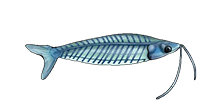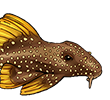
Got a picture?
Please do send it in!
| Scientific Name | Lepthoplosternum ucamara Reis & Kaefer, 2005 |
| Common Names | Ucamara Catfish Ucamarapansermalle, Ucamarapansermalle (Denmark) |
| Type Locality | Small creek into cocho Zapote, tributary to Río Pacaya, 5°20'16"S, 74°29'10"W, Río Ucayali drainage, Pacaya-Samiria National Reserve, Loreto, Peru. |
| Pronunciation | lep THOP low STERN um |
| Etymology | Lepthoplosternum: From the Greek leptos, meaning small and hoplosternum; in reference to the small size. Hoplosternum: From the Greek hoplon, meaning shield and sternum, meaning breast; in reference to the prominent coracoid bones on the breast. |
| Size | 46mm or 1.8" SL. Find near, nearer or same sized spp. |
| Identification | Lepthoplosternum species are the smallest of the Callichthyinae (maximum SL = 60.3 mm). They are distinguished by two unique traits: (1) a lower lip with a deep medial notch and a smaller lateral notch, forming two fleshy semi-triangular projections on each side of the midline, and a single unbranched ray preceding the branched rays on the anal fin. |
| Sexing | Mature males of Callichthys, Dianema, Hoplosternum, Lepthoplosternum, and Megalechis have a thick adipose body on the ventral surface of the pectoral fin. In Dianema, Hoplosternum, Lepthoplosternum and Megalechis (but not in Callichthys), the coracoid bones are at least partially exposed and expanded medially. In Dianema, Hoplosternum and Megalechis, these medial expansions of the coracoids are especially developed, covering most of the skin between the pectoral fins and sometimes overlapping at the midline in fully developed mature males, however there does not appear to be a similar sexually dimorphic expansion of the coracoids in Lepthoplosternum. |
| Distribution | South America: Peru and Brazil; very likely ot occur at the intermediate whitewater floodplain localities along much of the upper Amazon. Amazon, Upper Amazon, Marañón, Ucayali, Lower Ucayali (click on these areas to find other species found there) Login to view the map. |
| IUCN Red List Category | Least Concern , range map and more is available on the IUCN species page. Last assessed 2020. |
| Breeding Reports | There is no breeding report. |
| Reference | Copeia 2005 (no. 4), pp 728, Figs. 1C, 4. |
| Registered Keepers | There is no registered keeper. |
| Wishlists | Love this species? Click the heart to add it to your wish list. There is no wish to keep this species. |
| Spotters | Spotted this species somewhere? Click the binoculars! There is no record of this fish being seen. |
| Forum BBCode | |
| Search for L. ucamara | |
| Look up L. ucamara on AquaticRepublic.com | |
 | Look up L. ucamara on Fishbase |
 | Look up L. ucamara on Encyclopedia of Life |
 | Look up L. ucamara on Global Biodiversity Information Facility |
| LFS label creator ARN ref:1.1.9.7244 | |
| Last Update | 2025 Jan 02 00:44 (species record created: 2018 Aug 22 13:39) |




